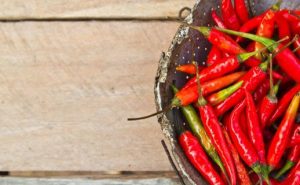The latest Harvard study proved that hot peppers prevent obesity, cancer and heart disease.

"These are the latest results," said Lu Qi, an associate professor in the TH Chan Institute of Nutrition at the Harvard School of Public Health and the Channing Institute of Medicine, Brigham and Women's Hospital, and collaborators of the study. "To our knowledge, this study is the first confirmation of a link between spicy food intake and mortality."
Scientists studied health and nutritional data collected from 487,375 people, aged 30-79, who were between 2004-2008. were enrolled in the Chinese Kadoorie Biobank. Participants with a history of cancer, heart disease and stroke were excluded from the study. During the 7.2-year period, there were 11,820 deaths among men, while the figure was 8,404 among women.

Fresh and dried chili peppers were the most commonly used spices, according to a study conducted on Chinese respondents. Previous studies have shown that Capsaicin and other bioactive ingredients of chili peppers cooperate in the fight against obesity, are antioxidants, have anti-inflammatory and anti-cancer properties.
This study is supported by grants (81390541, 81390544) from the National Natural Science Foundation of the Republic of China; a grant (2011BAI09B01, 2012-14) from the National Key Technologies Research and Development Program in the 12th Five-Year Plan, Ministry of Science and Technology of China; by a grant (088.158 / Z / 09 / Z) from the Wellcome Trust in Great Britain; and a grant from the Kadoorie Charitable Foundation in Hong Kong. Qi is supported by the National Institutes of Health Support from the National Heart, Lung, and Blood Institute (HL071981, HL034594, HL126024), the National Institute of Diabetes and Digestive and Kidney Diseases (DK091718, DK100383, DK078616), the Boston Obesity Research Center, (DK46200) and Binational Science Foundation Grant, USA-Israel 2011036. Qi is also a recipient of an American Heart Association Scientist Development Award (0730094N).
"Spicy food consumption and total and cause-specific mortality: a study based on a population-based cohort study," Jun LV, Lu Qi, Canqing Yu, Ling Yang Yu Guo, Yiping Chen, Dianjianyi Sun, Jianwei Du, Pengfei Ge, Zhenzhu Tang, Wei Hou, Yanjie Li, Junshi Chen, Zhengming Chen, Liming Li, BMJ, Published online August 4, 2015, DOI: 10.1136 / bmj.h4932
A LITTLE MORE ABOUT HOT PEPPER
Cayenne chili pepper was the subject of research by many phytotherapists Dr. Christopher... All of them were amazed by the medicinal properties that this variety of pepper possesses.

There are several ways to self-help with cayenne pepper, and some of them are particularly effective. The most important thing is that there is cayenne pepper minimum 100,000 Scoville unit on the scale for measuring spiciness (Scoville Heat Units-SHU). Examples of such hot varieties are: Trinidad Moruga Scorpion, Naga Viper, Naga Bhut Jolokia, Habanero, African Bird, Thai Chi, Jamaican hot pepper, Jalapeno, Scotch Bonet.
In case you have a chili pepper like this nearby, you should give the patient a mixture of one small teaspoon of cayenne pepper mixed in a glass of water to drink, of course, the patient must be conscious and breathing.
A simpler variant is to always have a small bottle of hot pepper tincture with you. In case the person is unconscious, the formula can help. Give the person 5-10 drops of tincture directly under the tongue. And you repeat that every 5 minutes.
The best cayenne pepper tincture recipe
The tincture according to the following recipe is the best tincture for heart attack emergencies. To note, do not use hot pepper, but cayenne pepper, which is the most famous type of chili pepper, and is grown mostly in India and South America. Chili is a bushy tropical plant, which differs from paprika in that it is a perennial plant. Ground chilies are twenty times hotter than regular peppers because they contain much more of the peppery alkaloid capsaicin. The hotness of chilies is inversely proportional to the size of the fruits, so the smallest fruits are the hottest. Get the types described above.
Composition:
- Cayenne pepper powder
- A few fresh cayenne peppers (if you don't have any, you can just use powder)
- 50% alcohol (some use vodka or apple cider vinegar if you don't want alcohol)
- 1 liter bottle
- gloves
Preparation:
Put on gloves (because of the heat from the chili).
Fill ¼ of a 1 liter jar with cayenne pepper powder.
On the side, blend a few whole fresh peppers with enough alcohol to make a sauce-like mixture.
Add that mixture to the first so that it fills ¾ of the jar.
Then fill the jar all the way with alcohol and close it. Shake it as often as possible during the day.
Leave the tincture for two weeks with daily shaking and then strain it through cheesecloth into a dark bottle. If you want a super strong tincture, strain it after 3 months. Close the bottle well and put it in a dark and dry place. Lasts indefinitely.
Dosage
If a person who has had a heart attack (angina pectoris) or a stroke is conscious, give them 5-10 drops of tincture. Repeat the dose in 5 minutes. Continue to repeat the treatment until the desired improvement. If the person is unconscious, drip 1-3 drops under their tongue and start resuscitation. After 5 minutes, repeat the dosage. Repeat every 5 minutes until desired improvement.Be sure to seek medical help.
Others use cayenne pepper
Cayenne pepper can also be useful for other ailments. It has antifungal properties and prevents the occurrence of fungal pathogens Phomopsis and Colletotrichum. It is known for its digestive effect because it stimulates the production of gastric juices, and also eases and reduces gas in the intestines.
The same thing is emphasized by Darija Vranešić Bender, clinical nutritionist at KBC Zagreb, who pointed out for Hina that, although it is a common opinion that hot peppers or chillies are not recommended for dyspepsia (feelings of pain or discomfort in the upper part of the abdominal cavity), research shows otherwise. "The active substance from hot peppers - capsaicin - has a protective effect on the stomach lining. It seems that capsaicin does not stimulate but rather inhibits the secretion of gastric acid and stimulates blood flow to the mucous tissue of the stomach," she said.
Still, Vranešić Bender emphasizes that acute exposure to higher concentrations of capsaicin and chili can worsen abdominal pain and burning sensation in dyspeptic patients.

It also has certain anti-cancer effects and is especially recommended for lung cancer patients and smokers. Capsaicin from cayenne pepper is thought to help prevent the development of tumors caused by tobacco, and similar results have been reported in liver cancer. It is also useful for stomach problems, flu symptoms, migraines, allergies, redness, obesity, toothache and arthritis. Vranešić Bender explains that capsaicin has a medicinal effect because it acts as an antiseptic, and in the digestive system it prevents the development of putrefactive bacteria and improves food digestion by irritating the intestinal mucosa.
Capsaicin, points out Vranešić Bender, is being researched in numerous areas and is they are hoping for use in arthritis, excess weight, and the latest research has linked capsaicin to lower mortality and longevity.
She gave an example of a study published a few years ago in the journal "Physiology & Behavior", which examined the effect of one gram of dried and ground hot pepper. The results, she said, showed that the intake of hot peppers increases body temperature and thus energy consumption. In addition, it was discovered that the consumption of red pepper affects the reduction of the feeling of hunger and the desire for extremely fatty, salty and sweet food, but only in people who do not have the habit of consuming red pepper.
Nutritional value of cayenne pepper
Scientists have confirmed the presence of 26 types of nutrients in cayenne pepper. Some of the most important minerals found in it are calcium, zinc, selenium and magnesium. In addition to minerals, cayenne pepper is also rich in vitamins - C and A.
Cayenne pepper is one of the strongest natural spices that can do wonders for the heart.
If you are a heart patient yourself or someone in your household, always have this life-saving tincture ready.




